Unit 6(复习课件)-2023-2024学年五年级英语上册单元速记巧练(译林版三起)(共60张PPT)
文档属性
| 名称 | Unit 6(复习课件)-2023-2024学年五年级英语上册单元速记巧练(译林版三起)(共60张PPT) |

|
|
| 格式 | pptx | ||
| 文件大小 | 8.8MB | ||
| 资源类型 | 试卷 | ||
| 版本资源 | 牛津译林版 | ||
| 科目 | 英语 | ||
| 更新时间 | 2023-11-15 00:00:00 | ||
图片预览

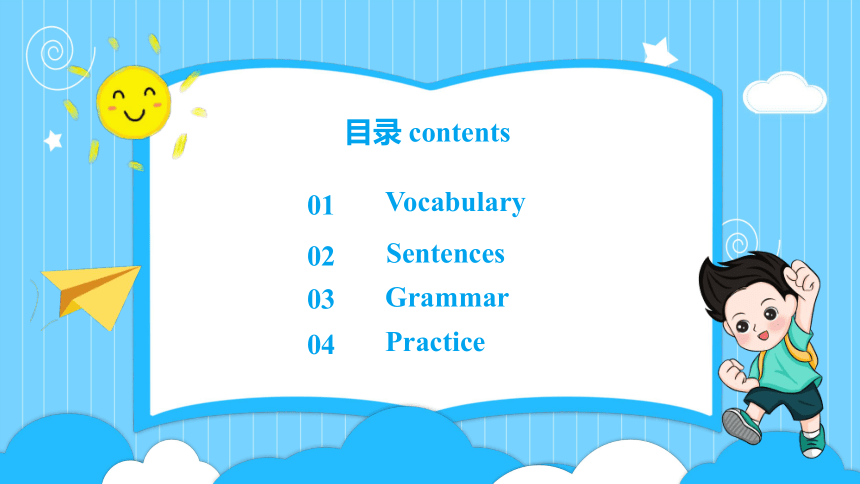
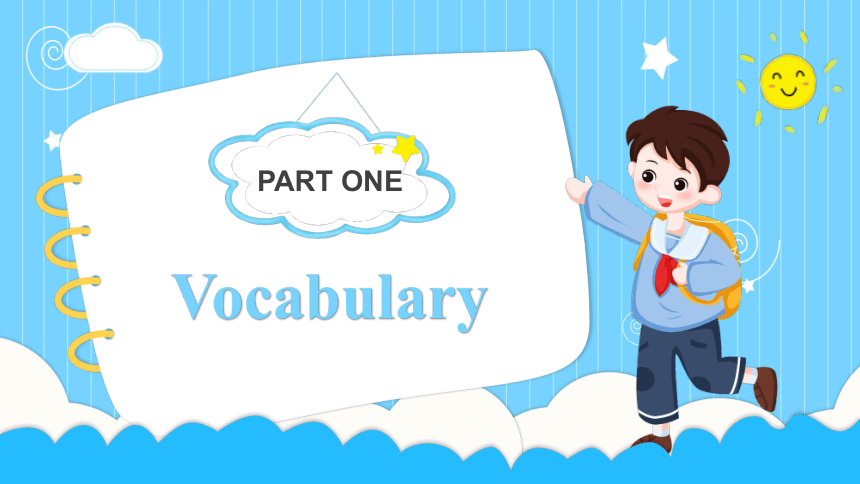
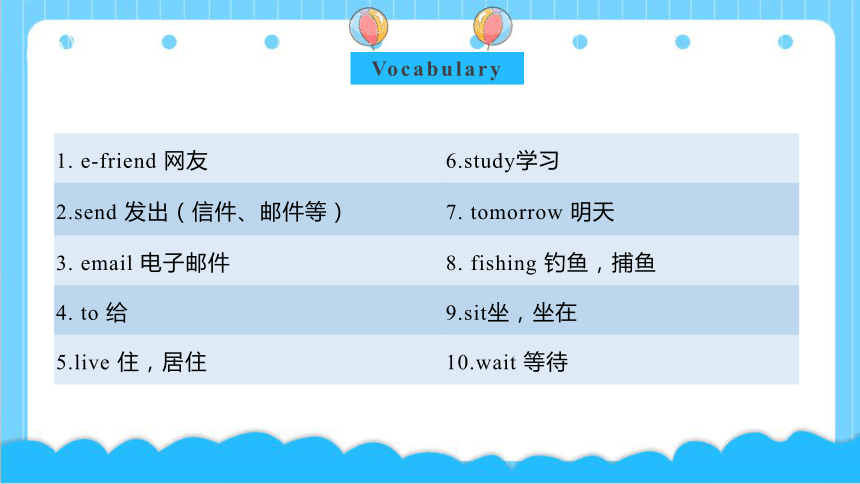
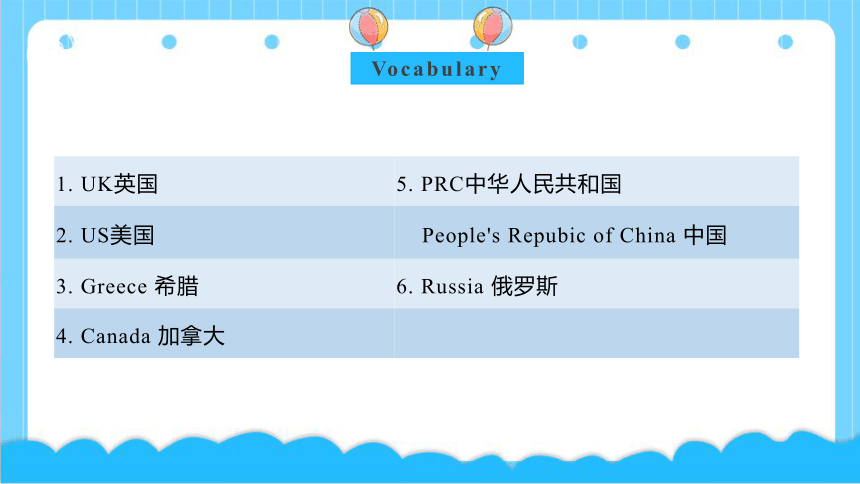
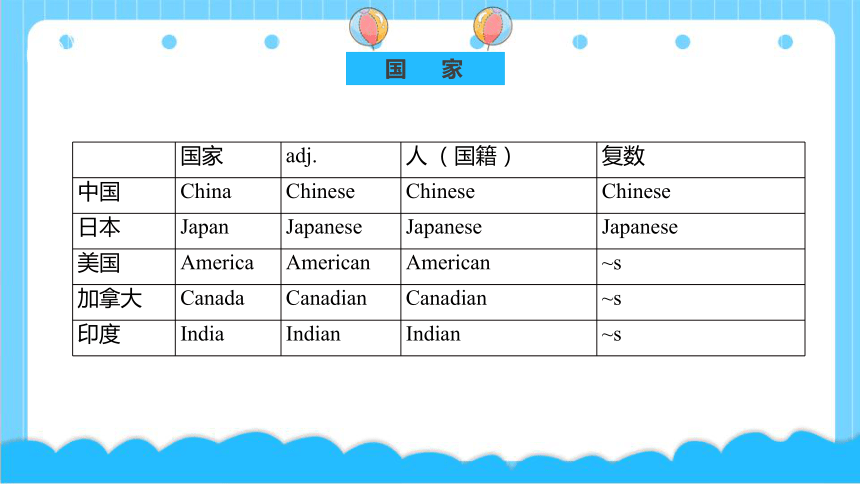
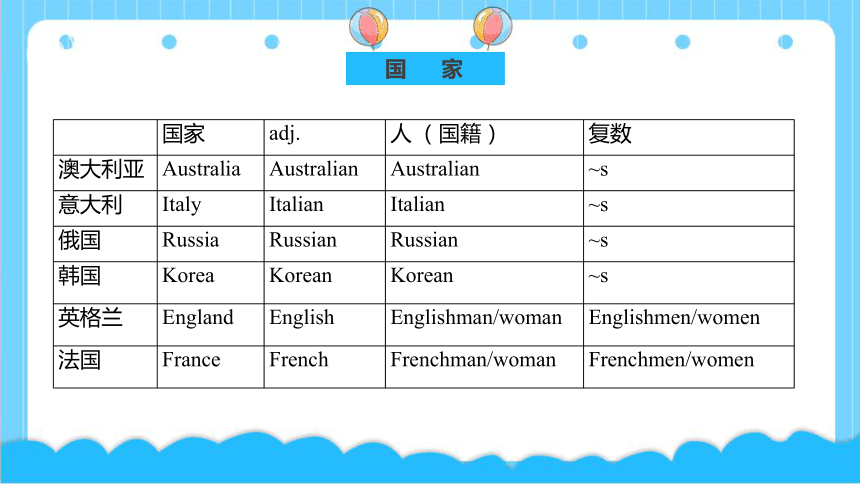
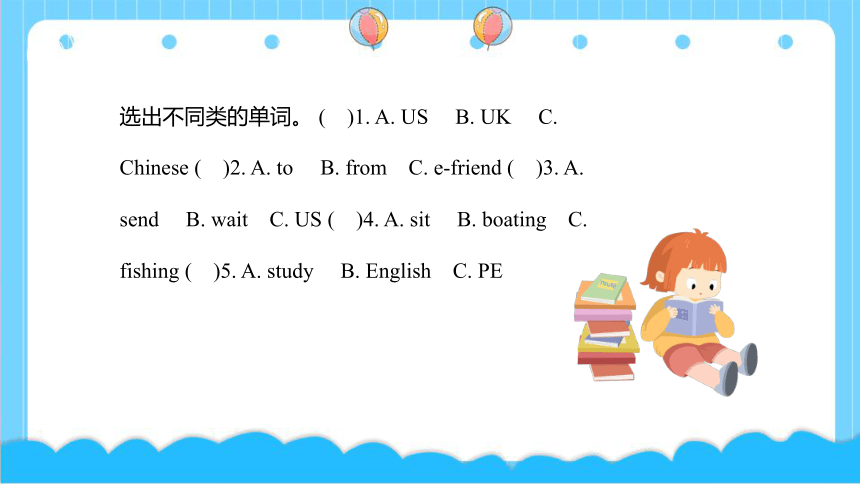
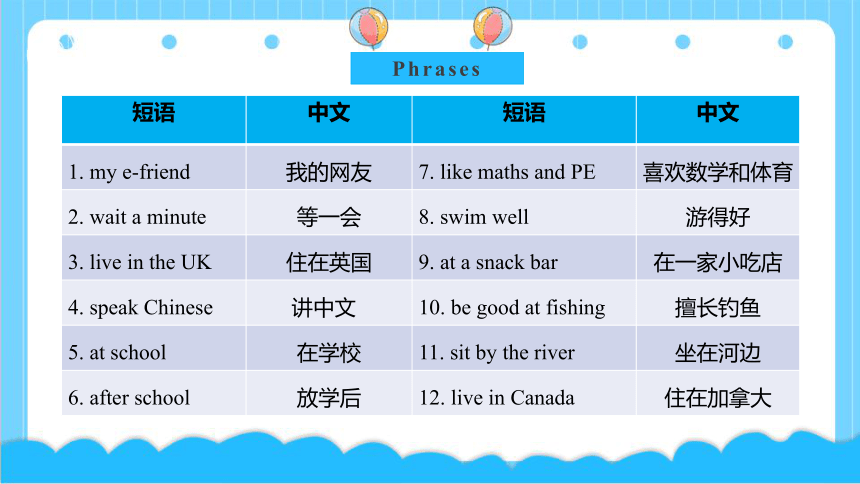
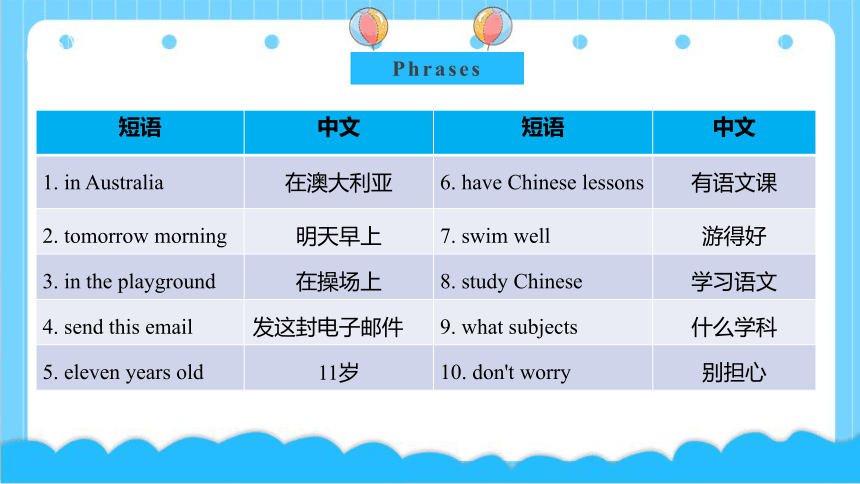
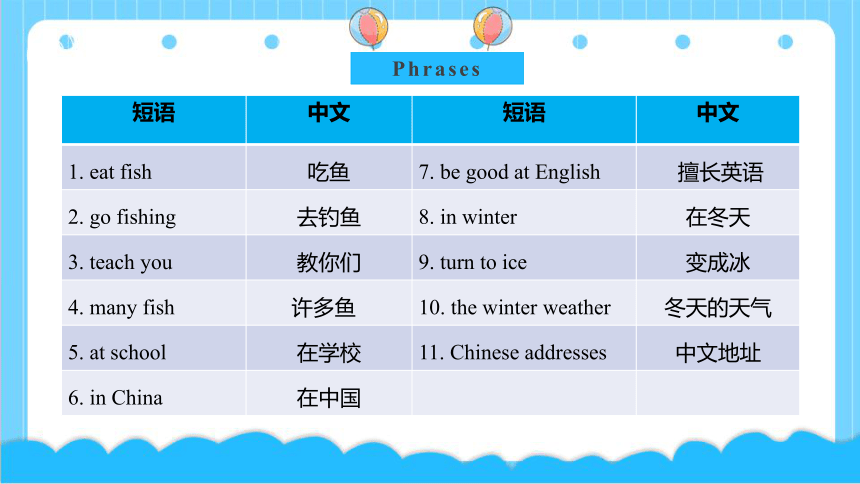
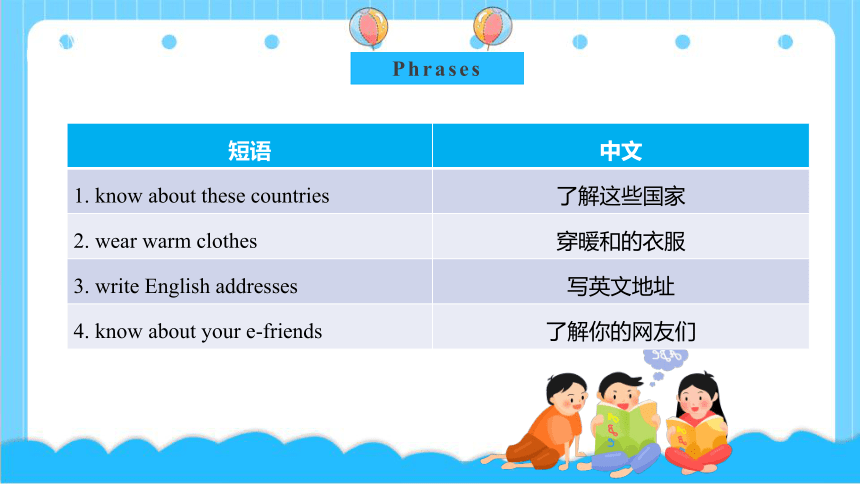
文档简介
(共60张PPT)
Unit 6
Unit 6
My e-friend 复习
译林版五年级上册
行业PPT模板http:///hangye/
目录 contents
Vocabulary
01
Sentences
02
Grammar
03
Practice
04
PART ONE
Vocabulary
Vocabulary
1. e-friend 网友 6.study学习
2.send 发出(信件、邮件等) 7. tomorrow 明天
3. email 电子邮件 8. fishing 钓鱼,捕鱼
4. to 给 9.sit坐,坐在
5.live 住,居住 10.wait 等待
Vocabulary
1. UK英国 5. PRC中华人民共和国
2. US美国 People's Repubic of China 中国
3. Greece 希腊 6. Russia 俄罗斯
4. Canada 加拿大
国 家
国家 adj. 人 (国籍) 复数
中国 China Chinese Chinese Chinese
日本 Japan Japanese Japanese Japanese
美国 America American American ~s
加拿大 Canada Canadian Canadian ~s
印度 India Indian Indian ~s
国 家
国家 adj. 人 (国籍) 复数
澳大利亚 Australia Australian Australian ~s
意大利 Italy Italian Italian ~s
俄国 Russia Russian Russian ~s
韩国 Korea Korean Korean ~s
英格兰 England English Englishman/woman Englishmen/women
法国 France French Frenchman/woman Frenchmen/women
选出不同类的单词。 ( )1. A. US B. UK C. Chinese ( )2. A. to B. from C. e-friend ( )3. A. send B. wait C. US ( )4. A. sit B. boating C. fishing ( )5. A. study B. English C. PE
Phrases
短语 中文 短语 中文
1. my e-friend 我的网友 7. like maths and PE 喜欢数学和体育
2. wait a minute 等一会 8. swim well 游得好
3. live in the UK 住在英国 9. at a snack bar 在一家小吃店
4. speak Chinese 讲中文 10. be good at fishing 擅长钓鱼
5. at school 在学校 11. sit by the river 坐在河边
6. after school 放学后 12. live in Canada 住在加拿大
Phrases
短语 中文 短语 中文
1. in Australia 在澳大利亚 6. have Chinese lessons 有语文课
2. tomorrow morning 明天早上 7. swim well 游得好
3. in the playground 在操场上 8. study Chinese 学习语文
4. send this email 发这封电子邮件 9. what subjects 什么学科
5. eleven years old 11岁 10. don't worry 别担心
Phrases
短语 中文 短语 中文
1. eat fish 吃鱼 7. be good at English 擅长英语
2. go fishing 去钓鱼 8. in winter 在冬天
3. teach you 教你们 9. turn to ice 变成冰
4. many fish 许多鱼 10. the winter weather 冬天的天气
5. at school 在学校 11. Chinese addresses 中文地址
6. in China 在中国
Phrases
短语 中文
1. know about these countries 了解这些国家
2. wear warm clothes 穿暖和的衣服
3. write English addresses 写英文地址
4. know about your e-friends 了解你的网友们
PART TWO
Sentences
Sentences
1. Do you have an e-friend 你有一位网友吗?
Yes, I do. 是的,我有。
2. Do they like swimming 他们喜欢游泳吗?
No, they don’t. 不,他们不喜欢。
3. Does he have Chinese lessons 他有语文课吗?
Yes, he does. 是的,他有。
4. Does she sing well 她唱歌好吗?
No, she doesn’t. 不,不好。
Sentences
5. What subjects does he like 他喜欢什么学科?
He likes maths and PE. 他喜欢数学和体育。
6. What subjects does she like 她喜欢什么学科?
She likes Music and Art.她喜欢音乐和美术。
7. Let me send this email to my e-friend. 让我给网友发个电子邮件。
8. Where does he live 他住在哪里?
He lives in the UK. 他住在英国。
Sentences
9. How old is he 他几岁了?
He’s 11 years old. 他11岁。
10. Can he speak Chinese 他会讲汉语吗?
Yes, he can. 是的,他会。
11. What does he do after school 放学后他做什么?
He studies Chinese. 他学汉语。
Sentences
12. What do fish eat 鱼吃什么?
They eat apples. 它们吃苹果。
13. Bobby waits and waits. 波比等呀等。
14. Let’s go fishing tomorrow. 让我们明天去钓鱼。
15.I can teach you. 我会教你。
16. Let me send this email to my e-friend. 让我给网友发个电子邮件。
17. Where does he live 他住在哪里?
He lives in the UK. 他住在英国。
18. How old is he 他几岁了? He’s 11 years old. 他11岁。
19 Can he speak Chinese 他会讲汉语吗?
Yes, he can. 是的,他会。
Sentences
20. What does he do after school 放学后他做什么? He studies Chinese. 他学汉语。
21. What do fish eat 鱼吃什么? They eat apples. 它们吃苹果。
22. Bobby waits and waits. 波比等呀等。
23. Let’s go fishing tomorrow. 让我们明天去钓鱼。 24 .I can teach you. 我会教你。
Sounds
发音组合:w wh
代表单词:wait west way wet will wide
wheel what why when where while
音标对比:[ w ] [ v ]
wet vase
winter inventure
world voice
women visit
PART THREE
Grammar
一般疑问句的综合复习
1. 什么是一般疑问句?答:用Yes或No作答的疑问句叫一般疑问句。
一般疑问句的综合复习
2. 从陈述句变为一般疑问句的变法:1) 当谓语动词部分是be动词或情态动词时,直接将其移到句首,然后首字母大写,结尾加问号。She is a student. --- Is she a student He can swim. ---- Can he swim
一般疑问句的综合复习
2) 当谓语动词是实意动词时,要借助助动词帮忙。
Tom likes animals. -----Does Tom like animals
(助动词好词做到底,即帮实意动词变一般疑问句,又帮实意动词把三单提前,实意动词自己轻装上阵就可以。)
一般疑问句的综合复习
4.一般疑问句的回答:
(1)当谓语动词部分是be动词或情态动词时,回答是要用be动词和情态动词本身。
Is she a student Yes, she is. / No, she isn’t.
Can he swim Yes, he can. / No, he can’t.
(2)当谓语动词是实意动词时,要借助助动词帮忙。
Does Tom like animals Yes, he does. / No, he doesn’t.
注意:
1.如果陈述句中有第一人称,则变问句时最好要变为第二人称。
例:I usually have lunch at school.
→Do you usually have lunch at school
2.如果陈述句中有some, 则变问句时往往要变成any 。
例: There is some water on the playground.
→Is there any water on the playground
注意:
3.复合句变一般疑问句通常只变主句,从句不变。
例:I know he comes from Canada.
→Do you know he comes from Canada
4.如果主语是 this that,回答 时用 it 代替,如果问句中主语是these, those 回答时用 they代替。
注意:
5.如果句中含有实义动词have且表示“有”时,除借do外,也可将其直接提到句首。
例:I have some friends in America.
→Have you any friends in America /Do you have any friends in America
Yes, I have. / No, I haven’t.
Yes, I do. / No, I don’t.
注意:
1.如果陈述句中有第一人称,则变问句时最好要变为第二人称。
例:I usually have lunch at school.
→Do you usually have lunch at school
2.如果陈述句中有some, 则变问句时往往要变成any 。
例: There is some water on the playground.
→Is there any water on the playground
1.do/does引导的一般疑问句句中没有be动词的句子,变为一般疑问句时要借助助动词do/does。助动词形态由主语人称决定。主语为第三人称单数时,用助动词does。其结构为Do/Does+主语+谓语动词+其他?肯定回答:Yes,主语+do/does. 否定回答:No,主语+don’t/doesn’t.例:-Does Lily like dancing?-Yes.Yes, she does./No, she doesn't.
1. for与to表示“给”的区别for是为,给 ;to是给,向。两者区别主要在于主观意愿的不同,前者的“给”更加强调“为了”。例如:I write a letter to my mother.我给(向)我的妈妈写信. I buy an apple for my mother.我为我的妈妈买了一个苹果.
(一)双宾语易位时需借助介词to的常用动词(多表示动词的方向) send sb. sth. = send sth. to sb. 把某物送给某人
show sb. sth. = show sth. to sb. 拿某物给某人看 read sb. sth. = read sth. to sb. 把某物读给某人听
take sb. sth. = take sth. to sb. 把某物拿给某人 write sb. sth. = write sth. to sb. 给某人写信
(二)双宾语易位时需借助介词for的常用动词(多表示动词的目的) book sb. sth. = book sth. for sb. 为某人预定某物
make sb. sth. = make sth. for sb. 为某人做某物 buy sb. sth. = buy sth. for sb. 为某人买某物
sing sb. sth. = sing sth. for sb. 为某人唱某物(歌)
cook sb. sth. = cook sth. for sb. 为某人煮某物
draw sb. sth. = draw sth. for sb. 为某人画某物
2. What subjects do/does ... like 这个句子用来询问他人喜欢什么科目。当主语是第三人称单数时,用助动词does。注意回答时 like后面要加-s。例:-What subjects does he like?-He likes PE.
Does she sing well 她唱歌好吗?
副词的用法一、副词是用来修饰动词、形容词、其他副词以及全句的词。1.The problem is very difficult.2. He wrote the letters carefully.
二.分类1. 方式副词:carefully, quickly, suddenly… 2. 地点副词:here, there, up, down…3. 时间副词:yesterday, today, now…4. 程度副词:very, quite, much, just…
三.形容词转化副词规则记住以下口诀:一般直接加,“元e”去e加,“辅y”改i加,“le”结尾e改y.1.一般情况下直接加“ly”,如: quick-quickly; polite-politely; sad-sadly; recent-recently
三.形容词转化副词规则记住以下口诀:一般直接加,“元e”去e加,“辅y”改i加,“le”结尾e改y. 2. 少数以e结尾的形容词,要去掉e再加-ly。如:true-truly; 绝大多数辅音字母加e结尾的形容词直接加-ly。如: wide-widely; nice-nicely
三.形容词转化副词规则记住以下口诀:一般直接加,“元e”去e加,“辅y”改i加,“le”结尾e改y. 3. 以“y”结尾的,且读音为 / i /, 先将“y”改成“i”,再加“ly”,如:
Healthy-healthily; busy-busily 但是如果读音为 / ai /, 直接加ly,如:dry-dryly; shy---shyly
PART FOUR
Practice
英汉互译。 1. 发一封电子邮件_______________ 2. have English lessons___________ 3. 等一会儿_____________________ 4. go fishing_____________________ 5. 擅长游泳_____________________ 6. at the snack bar________________ 7. 别担心_______________________ 8. study Chinese _________________ 9. 坐在河边_____________________ 10. after school__________________
英汉互译1.wait minute___________________ 2.send an email_________________ 3.warm clothes__________________ 4.by the river_________________ 5.Don’t worry_________________ 6.在中国______________________ 7.放学后_________________ 8.喜欢游泳_____________________ 9.教他_____________________ 10.说英语___________________
按要求填词1.write(现在分词)_____________ 2.many(近义词组)___________ 3.study(第三人称单数)__________ 4.well(形容词)___________ 5.can’t(完整形式)______________ 6.does not(缩略形式) _____________ 7.he(复数)________________ 8.have(第三人称单数) ______________
根据提示或所给单词的适当形式填空。 1. The teachers’ office is on the_____________(one) floor. 2. This is___________(Mike) friend. 3. He likes playing football and _____________(swim). 4. What ___________(学科)does he like 5. My uncle __________(live) in Shanghai.
根据提示或所给单词的适当形式填空。 6. He doesn’t __________(学习) English after school. 7. Mr. Black ___________(teach) maths in a middle school. 8. Let’s go ____________(run) tomorrow. 9. ___________ Liu Tao usually ___________ (play) football after school 10. Where ___________ he ___________(live)
用所给词的适当形式填空11.How old ________ (be) your brother 12.I can skate __________(good).13.He doesn’t __________(live) in Canada.14.Do you usually ________(play) the piano 15.She likes ___________(dance).
用所给词的适当形式填空16.Nancy ________________(not) like PE.17.My sister _____________(study) English at school.18.What _________Nancy usually __________(do) after school 19.The boy likes singing, but the girl ___________(do).
单项选择( )1._______ Liu Tao and his family ______ in Xi’an A. Do; live B. Does; live C. Are; live( )2.Do they have _____ A. some hobbies B. any hobbies C. much hobby( )3. Mike ____ like _____ table tennis. A. doesn’t; playing B. don’t; play C. isn’t; plays
单项选择( )4.---Does he play ____ --Yes, he ____.
A. good; does B. well; is C. well; does
( )5. We ____ go to school ____ Sundays.
A.don’t ; on B. doesn’t ;in C. aren’t ;at
( )6. Mr. Green works in a school. He is a _____.
A.teacher B. farmer C. doctor
单项选择( )7. Let’s go _______ tomorrow.
A.swim B. swimming C. swimming
( )8. Bobby _____ have _____ fish.
A.don’t ; any B. doesn’t ;some C. doesn’t ; any
( )9. Yang Ling can swim ______.
A.beautiful B. good C. well
单项选择( )10.--- ___________ your e-friend --- She is Su Hai.
A. Who B. Whose C. Who’s
( )11. --- ___________ they have English lessons at school
--- No, they ___________.
A. Do; do B. Does; doesn’t C. Do; don’t
( )12. Gao Shan ___________ play basketball with me.
A. want to B. wants to C. wants
根据中文完成句子1. 王兵放学后学习英语和音乐。 Wang Bing _________ English and Music __________school.2. —你的朋友周日有课吗?—是的,他有一节钢琴课。 —__________ your friend ___________any lessons on Sundays —Yes, he __________. He__________a piano lesson.
根据中文完成句子3. —南希在学校学习中文呢?— 不,他放学后学中文。
—__________ Nancy study __________ at school
—No, he ___________.He __________ Chinese after school.
4.—他喜欢什么学科?—他喜欢数学和体育。
—___________ subjects does he ___________
—He __________ maths and PE.
根据中文完成句子5. 他喜欢画画和滑冰。
He likes ________ and ________.
6 你能先发这封电子邮件吗?
________ you send this email ________
连词成句1. your, does, e-friend, singing, like ( ) _________________________________________________________2. subjects, do, like, what, you ( ) _________________________________________________________3. Let’s, play, and, football, go (.) _________________________________________________________4. he, does, Chinese, have, school, lessons, at ( ) _________________________________________________________5. she, in, lives, US, the (.) _________________________________________________________
按要求完成句子1. Jim sits behind me. Tom sits in front of me.(改为同义句) I _________ _____ Jim and Tom. 2. Parrots can talk and fly. (针对划线部分提问) __________ can parrots ________ 3. She likes singing.(改为一般疑问句) __________ she _________ singing
按要求完成句子 4. There is some soup on the table.(改为否定句) There’s ______ _______ soup on the table. 5. Wang Bing likes running. Liu Tao likes running too. (合并为一句) Wang Bing and Liu Tao _______________ running.
Weekends to people mean(意味着) that they can have two-day good rest. For example(例如) ,they can go out to visit their friends and relatives(亲戚).They can enjoy interesting CDs with their family. Everyone spends(度过) weekends in his own way. Within two days, some people listen to music, read books or watch films. Some people play basketball, swim or dance. I often spend my weekends with my friends. Sometimes I visit my friends, sometimes I go to the library to borrow(借)some books. I like reading. Outing(远足)is my favorite(最喜欢) way of spending weekends. Weekends are always enjoyable for me.
( )1.People have one-day good rest at the weekends.
( )2.Some people go to the cinema at the weekends.
( )3.I often spend my weekends with my grandparents.
( )4.Reading is my favorite way of spending weekends.
( )5. Different (不同)people have different weekends.
Thank you!
Unit 6
Unit 6
My e-friend 复习
译林版五年级上册
行业PPT模板http:///hangye/
目录 contents
Vocabulary
01
Sentences
02
Grammar
03
Practice
04
PART ONE
Vocabulary
Vocabulary
1. e-friend 网友 6.study学习
2.send 发出(信件、邮件等) 7. tomorrow 明天
3. email 电子邮件 8. fishing 钓鱼,捕鱼
4. to 给 9.sit坐,坐在
5.live 住,居住 10.wait 等待
Vocabulary
1. UK英国 5. PRC中华人民共和国
2. US美国 People's Repubic of China 中国
3. Greece 希腊 6. Russia 俄罗斯
4. Canada 加拿大
国 家
国家 adj. 人 (国籍) 复数
中国 China Chinese Chinese Chinese
日本 Japan Japanese Japanese Japanese
美国 America American American ~s
加拿大 Canada Canadian Canadian ~s
印度 India Indian Indian ~s
国 家
国家 adj. 人 (国籍) 复数
澳大利亚 Australia Australian Australian ~s
意大利 Italy Italian Italian ~s
俄国 Russia Russian Russian ~s
韩国 Korea Korean Korean ~s
英格兰 England English Englishman/woman Englishmen/women
法国 France French Frenchman/woman Frenchmen/women
选出不同类的单词。 ( )1. A. US B. UK C. Chinese ( )2. A. to B. from C. e-friend ( )3. A. send B. wait C. US ( )4. A. sit B. boating C. fishing ( )5. A. study B. English C. PE
Phrases
短语 中文 短语 中文
1. my e-friend 我的网友 7. like maths and PE 喜欢数学和体育
2. wait a minute 等一会 8. swim well 游得好
3. live in the UK 住在英国 9. at a snack bar 在一家小吃店
4. speak Chinese 讲中文 10. be good at fishing 擅长钓鱼
5. at school 在学校 11. sit by the river 坐在河边
6. after school 放学后 12. live in Canada 住在加拿大
Phrases
短语 中文 短语 中文
1. in Australia 在澳大利亚 6. have Chinese lessons 有语文课
2. tomorrow morning 明天早上 7. swim well 游得好
3. in the playground 在操场上 8. study Chinese 学习语文
4. send this email 发这封电子邮件 9. what subjects 什么学科
5. eleven years old 11岁 10. don't worry 别担心
Phrases
短语 中文 短语 中文
1. eat fish 吃鱼 7. be good at English 擅长英语
2. go fishing 去钓鱼 8. in winter 在冬天
3. teach you 教你们 9. turn to ice 变成冰
4. many fish 许多鱼 10. the winter weather 冬天的天气
5. at school 在学校 11. Chinese addresses 中文地址
6. in China 在中国
Phrases
短语 中文
1. know about these countries 了解这些国家
2. wear warm clothes 穿暖和的衣服
3. write English addresses 写英文地址
4. know about your e-friends 了解你的网友们
PART TWO
Sentences
Sentences
1. Do you have an e-friend 你有一位网友吗?
Yes, I do. 是的,我有。
2. Do they like swimming 他们喜欢游泳吗?
No, they don’t. 不,他们不喜欢。
3. Does he have Chinese lessons 他有语文课吗?
Yes, he does. 是的,他有。
4. Does she sing well 她唱歌好吗?
No, she doesn’t. 不,不好。
Sentences
5. What subjects does he like 他喜欢什么学科?
He likes maths and PE. 他喜欢数学和体育。
6. What subjects does she like 她喜欢什么学科?
She likes Music and Art.她喜欢音乐和美术。
7. Let me send this email to my e-friend. 让我给网友发个电子邮件。
8. Where does he live 他住在哪里?
He lives in the UK. 他住在英国。
Sentences
9. How old is he 他几岁了?
He’s 11 years old. 他11岁。
10. Can he speak Chinese 他会讲汉语吗?
Yes, he can. 是的,他会。
11. What does he do after school 放学后他做什么?
He studies Chinese. 他学汉语。
Sentences
12. What do fish eat 鱼吃什么?
They eat apples. 它们吃苹果。
13. Bobby waits and waits. 波比等呀等。
14. Let’s go fishing tomorrow. 让我们明天去钓鱼。
15.I can teach you. 我会教你。
16. Let me send this email to my e-friend. 让我给网友发个电子邮件。
17. Where does he live 他住在哪里?
He lives in the UK. 他住在英国。
18. How old is he 他几岁了? He’s 11 years old. 他11岁。
19 Can he speak Chinese 他会讲汉语吗?
Yes, he can. 是的,他会。
Sentences
20. What does he do after school 放学后他做什么? He studies Chinese. 他学汉语。
21. What do fish eat 鱼吃什么? They eat apples. 它们吃苹果。
22. Bobby waits and waits. 波比等呀等。
23. Let’s go fishing tomorrow. 让我们明天去钓鱼。 24 .I can teach you. 我会教你。
Sounds
发音组合:w wh
代表单词:wait west way wet will wide
wheel what why when where while
音标对比:[ w ] [ v ]
wet vase
winter inventure
world voice
women visit
PART THREE
Grammar
一般疑问句的综合复习
1. 什么是一般疑问句?答:用Yes或No作答的疑问句叫一般疑问句。
一般疑问句的综合复习
2. 从陈述句变为一般疑问句的变法:1) 当谓语动词部分是be动词或情态动词时,直接将其移到句首,然后首字母大写,结尾加问号。She is a student. --- Is she a student He can swim. ---- Can he swim
一般疑问句的综合复习
2) 当谓语动词是实意动词时,要借助助动词帮忙。
Tom likes animals. -----Does Tom like animals
(助动词好词做到底,即帮实意动词变一般疑问句,又帮实意动词把三单提前,实意动词自己轻装上阵就可以。)
一般疑问句的综合复习
4.一般疑问句的回答:
(1)当谓语动词部分是be动词或情态动词时,回答是要用be动词和情态动词本身。
Is she a student Yes, she is. / No, she isn’t.
Can he swim Yes, he can. / No, he can’t.
(2)当谓语动词是实意动词时,要借助助动词帮忙。
Does Tom like animals Yes, he does. / No, he doesn’t.
注意:
1.如果陈述句中有第一人称,则变问句时最好要变为第二人称。
例:I usually have lunch at school.
→Do you usually have lunch at school
2.如果陈述句中有some, 则变问句时往往要变成any 。
例: There is some water on the playground.
→Is there any water on the playground
注意:
3.复合句变一般疑问句通常只变主句,从句不变。
例:I know he comes from Canada.
→Do you know he comes from Canada
4.如果主语是 this that,回答 时用 it 代替,如果问句中主语是these, those 回答时用 they代替。
注意:
5.如果句中含有实义动词have且表示“有”时,除借do外,也可将其直接提到句首。
例:I have some friends in America.
→Have you any friends in America /Do you have any friends in America
Yes, I have. / No, I haven’t.
Yes, I do. / No, I don’t.
注意:
1.如果陈述句中有第一人称,则变问句时最好要变为第二人称。
例:I usually have lunch at school.
→Do you usually have lunch at school
2.如果陈述句中有some, 则变问句时往往要变成any 。
例: There is some water on the playground.
→Is there any water on the playground
1.do/does引导的一般疑问句句中没有be动词的句子,变为一般疑问句时要借助助动词do/does。助动词形态由主语人称决定。主语为第三人称单数时,用助动词does。其结构为Do/Does+主语+谓语动词+其他?肯定回答:Yes,主语+do/does. 否定回答:No,主语+don’t/doesn’t.例:-Does Lily like dancing?-Yes.Yes, she does./No, she doesn't.
1. for与to表示“给”的区别for是为,给 ;to是给,向。两者区别主要在于主观意愿的不同,前者的“给”更加强调“为了”。例如:I write a letter to my mother.我给(向)我的妈妈写信. I buy an apple for my mother.我为我的妈妈买了一个苹果.
(一)双宾语易位时需借助介词to的常用动词(多表示动词的方向) send sb. sth. = send sth. to sb. 把某物送给某人
show sb. sth. = show sth. to sb. 拿某物给某人看 read sb. sth. = read sth. to sb. 把某物读给某人听
take sb. sth. = take sth. to sb. 把某物拿给某人 write sb. sth. = write sth. to sb. 给某人写信
(二)双宾语易位时需借助介词for的常用动词(多表示动词的目的) book sb. sth. = book sth. for sb. 为某人预定某物
make sb. sth. = make sth. for sb. 为某人做某物 buy sb. sth. = buy sth. for sb. 为某人买某物
sing sb. sth. = sing sth. for sb. 为某人唱某物(歌)
cook sb. sth. = cook sth. for sb. 为某人煮某物
draw sb. sth. = draw sth. for sb. 为某人画某物
2. What subjects do/does ... like 这个句子用来询问他人喜欢什么科目。当主语是第三人称单数时,用助动词does。注意回答时 like后面要加-s。例:-What subjects does he like?-He likes PE.
Does she sing well 她唱歌好吗?
副词的用法一、副词是用来修饰动词、形容词、其他副词以及全句的词。1.The problem is very difficult.2. He wrote the letters carefully.
二.分类1. 方式副词:carefully, quickly, suddenly… 2. 地点副词:here, there, up, down…3. 时间副词:yesterday, today, now…4. 程度副词:very, quite, much, just…
三.形容词转化副词规则记住以下口诀:一般直接加,“元e”去e加,“辅y”改i加,“le”结尾e改y.1.一般情况下直接加“ly”,如: quick-quickly; polite-politely; sad-sadly; recent-recently
三.形容词转化副词规则记住以下口诀:一般直接加,“元e”去e加,“辅y”改i加,“le”结尾e改y. 2. 少数以e结尾的形容词,要去掉e再加-ly。如:true-truly; 绝大多数辅音字母加e结尾的形容词直接加-ly。如: wide-widely; nice-nicely
三.形容词转化副词规则记住以下口诀:一般直接加,“元e”去e加,“辅y”改i加,“le”结尾e改y. 3. 以“y”结尾的,且读音为 / i /, 先将“y”改成“i”,再加“ly”,如:
Healthy-healthily; busy-busily 但是如果读音为 / ai /, 直接加ly,如:dry-dryly; shy---shyly
PART FOUR
Practice
英汉互译。 1. 发一封电子邮件_______________ 2. have English lessons___________ 3. 等一会儿_____________________ 4. go fishing_____________________ 5. 擅长游泳_____________________ 6. at the snack bar________________ 7. 别担心_______________________ 8. study Chinese _________________ 9. 坐在河边_____________________ 10. after school__________________
英汉互译1.wait minute___________________ 2.send an email_________________ 3.warm clothes__________________ 4.by the river_________________ 5.Don’t worry_________________ 6.在中国______________________ 7.放学后_________________ 8.喜欢游泳_____________________ 9.教他_____________________ 10.说英语___________________
按要求填词1.write(现在分词)_____________ 2.many(近义词组)___________ 3.study(第三人称单数)__________ 4.well(形容词)___________ 5.can’t(完整形式)______________ 6.does not(缩略形式) _____________ 7.he(复数)________________ 8.have(第三人称单数) ______________
根据提示或所给单词的适当形式填空。 1. The teachers’ office is on the_____________(one) floor. 2. This is___________(Mike) friend. 3. He likes playing football and _____________(swim). 4. What ___________(学科)does he like 5. My uncle __________(live) in Shanghai.
根据提示或所给单词的适当形式填空。 6. He doesn’t __________(学习) English after school. 7. Mr. Black ___________(teach) maths in a middle school. 8. Let’s go ____________(run) tomorrow. 9. ___________ Liu Tao usually ___________ (play) football after school 10. Where ___________ he ___________(live)
用所给词的适当形式填空11.How old ________ (be) your brother 12.I can skate __________(good).13.He doesn’t __________(live) in Canada.14.Do you usually ________(play) the piano 15.She likes ___________(dance).
用所给词的适当形式填空16.Nancy ________________(not) like PE.17.My sister _____________(study) English at school.18.What _________Nancy usually __________(do) after school 19.The boy likes singing, but the girl ___________(do).
单项选择( )1._______ Liu Tao and his family ______ in Xi’an A. Do; live B. Does; live C. Are; live( )2.Do they have _____ A. some hobbies B. any hobbies C. much hobby( )3. Mike ____ like _____ table tennis. A. doesn’t; playing B. don’t; play C. isn’t; plays
单项选择( )4.---Does he play ____ --Yes, he ____.
A. good; does B. well; is C. well; does
( )5. We ____ go to school ____ Sundays.
A.don’t ; on B. doesn’t ;in C. aren’t ;at
( )6. Mr. Green works in a school. He is a _____.
A.teacher B. farmer C. doctor
单项选择( )7. Let’s go _______ tomorrow.
A.swim B. swimming C. swimming
( )8. Bobby _____ have _____ fish.
A.don’t ; any B. doesn’t ;some C. doesn’t ; any
( )9. Yang Ling can swim ______.
A.beautiful B. good C. well
单项选择( )10.--- ___________ your e-friend --- She is Su Hai.
A. Who B. Whose C. Who’s
( )11. --- ___________ they have English lessons at school
--- No, they ___________.
A. Do; do B. Does; doesn’t C. Do; don’t
( )12. Gao Shan ___________ play basketball with me.
A. want to B. wants to C. wants
根据中文完成句子1. 王兵放学后学习英语和音乐。 Wang Bing _________ English and Music __________school.2. —你的朋友周日有课吗?—是的,他有一节钢琴课。 —__________ your friend ___________any lessons on Sundays —Yes, he __________. He__________a piano lesson.
根据中文完成句子3. —南希在学校学习中文呢?— 不,他放学后学中文。
—__________ Nancy study __________ at school
—No, he ___________.He __________ Chinese after school.
4.—他喜欢什么学科?—他喜欢数学和体育。
—___________ subjects does he ___________
—He __________ maths and PE.
根据中文完成句子5. 他喜欢画画和滑冰。
He likes ________ and ________.
6 你能先发这封电子邮件吗?
________ you send this email ________
连词成句1. your, does, e-friend, singing, like ( ) _________________________________________________________2. subjects, do, like, what, you ( ) _________________________________________________________3. Let’s, play, and, football, go (.) _________________________________________________________4. he, does, Chinese, have, school, lessons, at ( ) _________________________________________________________5. she, in, lives, US, the (.) _________________________________________________________
按要求完成句子1. Jim sits behind me. Tom sits in front of me.(改为同义句) I _________ _____ Jim and Tom. 2. Parrots can talk and fly. (针对划线部分提问) __________ can parrots ________ 3. She likes singing.(改为一般疑问句) __________ she _________ singing
按要求完成句子 4. There is some soup on the table.(改为否定句) There’s ______ _______ soup on the table. 5. Wang Bing likes running. Liu Tao likes running too. (合并为一句) Wang Bing and Liu Tao _______________ running.
Weekends to people mean(意味着) that they can have two-day good rest. For example(例如) ,they can go out to visit their friends and relatives(亲戚).They can enjoy interesting CDs with their family. Everyone spends(度过) weekends in his own way. Within two days, some people listen to music, read books or watch films. Some people play basketball, swim or dance. I often spend my weekends with my friends. Sometimes I visit my friends, sometimes I go to the library to borrow(借)some books. I like reading. Outing(远足)is my favorite(最喜欢) way of spending weekends. Weekends are always enjoyable for me.
( )1.People have one-day good rest at the weekends.
( )2.Some people go to the cinema at the weekends.
( )3.I often spend my weekends with my grandparents.
( )4.Reading is my favorite way of spending weekends.
( )5. Different (不同)people have different weekends.
Thank you!
